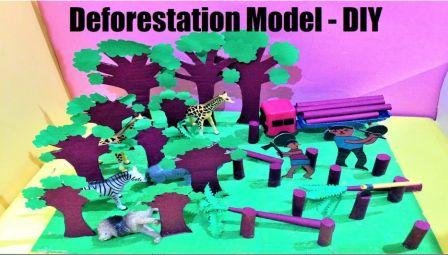Introduction:
Ladies and gentlemen, esteemed judges, and fellow advocates for our environment,
Today, I am honored to present a science project that delves into one of the most critical environmental issues of our time – deforestation.

As we gather here at this science exhibition, let us embark on a journey to understand the science behind deforestation, its far-reaching consequences, and the urgent need to address this pressing challenge.
Deforestation: The Silent Crisis:
Imagine a world where lush forests teem with life, purify the air we breathe, and regulate our climate. Now imagine that world disappearing before our eyes. This is the stark reality of deforestation, the widespread removal of forests for various purposes, including agriculture, logging, and urbanization.
The Scope of Deforestation:
Deforestation is a global issue, affecting forests in every corner of the world. According to recent estimates, we lose an area of forest equivalent to 27 soccer fields every minute. The consequences of this loss are profound and impact us all.
The Science of Deforestation:
1. Carbon Sink: Forests are natural carbon sinks, absorbing carbon dioxide (CO2) from the atmosphere and storing it in trees and soil. When forests are cleared, this stored carbon is released, contributing to greenhouse gas emissions and climate change.
2. Biodiversity Loss: Forests are home to an incredible diversity of plant and animal species. When forests are destroyed, countless species lose their habitat, leading to biodiversity loss and even extinction.
3. Water Cycle Disruption: Forests play a vital role in the water cycle by absorbing and releasing water gradually. Deforestation disrupts this cycle, leading to soil erosion, reduced water quality, and an increased risk of floods and droughts.
4. Climate Regulation: Forests help regulate local and global climates by influencing temperature and precipitation patterns. Deforestation disrupts these processes, leading to more extreme weather events.
5. Human Impact: Indigenous communities and forest-dependent populations are disproportionately affected by deforestation, as it often leads to their displacement and loss of livelihoods.
Consequences for the Global Community:
Deforestation is not limited to the regions where it occurs; its consequences ripple across the globe. The release of CO2 from deforestation contributes to climate change, impacting weather patterns, agriculture, and sea levels worldwide.
Addressing Deforestation:
- Sustainable Forestry: Promoting sustainable logging practices that prioritize reforestation and responsible harvesting.
- Forest Conservation: Establishing protected areas and conservation efforts to safeguard critical forests and their biodiversity.
- Reforestation: Supporting reforestation projects to restore damaged ecosystems and mitigate climate change.
- Consumer Choices: Making conscious choices to support products with sustainable sourcing and advocating for responsible supply chains.
- Policy Advocacy: Advocating for policies that combat illegal logging, protect forests, and promote sustainable land use.
Conclusion:
In conclusion, deforestation is not just an environmental issue; it is a global crisis with far-reaching implications for our climate, biodiversity, and the well-being of present and future generations.
The science of deforestation reminds us that our actions have consequences that extend beyond borders and generations.
As we continue to explore the science of deforestation, let us remember that we have the power to make a difference.
By supporting sustainable practices, raising awareness, and advocating for policies that protect our forests, we can work towards a future where forests thrive, ecosystems flourish, and our planet remains a vibrant and healthy home for all.
Thank you for joining me on this journey to understand the science and significance of deforestation and the imperative to address this critical challenge.

